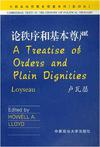论秩序和基本尊严
2003-7
中国政法大学出版社
卢瓦瑟
255
无
This is the first English edition of a treatise that influenced French thinkers from its publication in 1610 until the end of the ancien régime. In his Treatise of Orders and Plain Dignities, Charles Loyseau set out to harmonize with law his fellow citizens' values and behavior in the crucial sphere of possession and exercise of public power. The introduction to this edition sets this important text in the context of Loyseau's own political thesis and the intellectual milieu of those who administered early-modern France. "This first-ever English-language edition of a once-celebrated work by a contemporary of Jean Bodin is a valuable contribution to the Skinnerian project of filling in the intellectual valleys separating the 'peaks' of Plato and Aristotle, Augustine and Aquinas, Hobbes and Locke, Rousseau and Kant, and Hegel and Marx." Ethice.
作者:(法国)卢瓦瑟
AcknowledgementsIntroductionPrinapal events in Loyseau s lifeBibliographical noteNote on translation and citationsList of abbreviationsBiographical notesDedicatory epistle: Charles Loyseau to theHonourable Jean ForgetPreface1 Of order in general2 Of the Roman orders3 Of the order of the clergy4 Of the order of nobility in general5 Of plain gentlemen6 Of the high nobility7 Of princes8 Of the third estateg Of solemn deprivation of order10 Of the plain dignities of Rome11 Of the plain dignities of France
65. Out of these three sorts of people he made three several tribes, assigning to each one its separate canton to live in. But Servius Tul- lius, recognising how this distinction of three peoples could cause parties to form and seditions to break out, wanted Rome to be divided only by cantons and regions. He distributed it into four districts, desiring everyone to be identified with the district where he lived regardless of his race of origin. 66. Yet many notable citizens, being addicted to the rustic life, lived in the countryside around Rome and therefore had no district. So Servius Tullius made a further twenty-six districts out of the rural territory, and these were called 'rural tribes'. Consequently, there were then thirty Roman tribes in all, and the number afterwards rose to thirty-five. 67. Finally, the rural tribes came in time to be deemed more honour- able than those of the town which were mostly made up of freedmen or artisans..So such notable inhabitants as were left in the former had themselves enrolled by the censors in the rural tribes whilst continuing to live in the town. At length, in making the rolls and distinguishing between tribes atteMon ceased to be paid to the places where Roman citizens lived. The censors composed the rolls as they willed, very often placing town dwellers in rural tribes in order to honour them, and country dwellers in town tribes in order to single them out and penalise them. It was even a kind of disgrace and punishment to be transferred from a rural to a town tribe, as I will indicate shortly. 68. Each of the four town tribes was made up of ten sub-districts, called curiae. These were formed as a means of uniting and assem- bling the people, solely for religious purposes; hence, no doubt, the derivation of our 'cures', or parishes. I will not spend time on them here: my subject in this work is not religion, but only the temporal body politic. ……

无